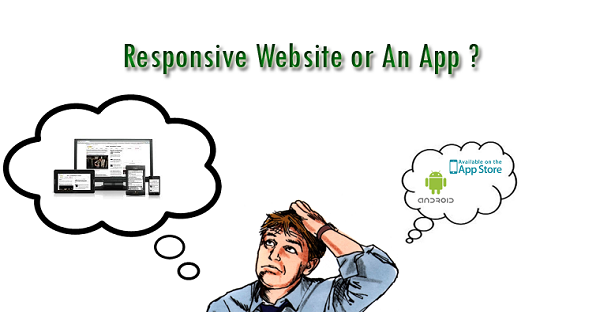With the advent of high speed internet and the amazingly flexible operating systems of our generation, the number and quality of mobile applications have crossed unprecedented limits. Which, as a result, has completely transformed the way mobile phone users use their devices. Consequently, companies and start-ups all over the world are shifting towards an approach that focuses on the mobile platform.
There are many possible approaches towards a mobile presence, including mobile applications and mobile websites, the latest and most popular one being a responsive web design.
But how do you choose between a Responsive Web Design and a Mobile App? It is not as if one is better than the other, but rather, the decision depends on the demand. Let’s take a look on what you must keep in mind in order to make the right choice according to your specific business needs.
Mobile Web Applications
While creating a website, if the developer fails to keep both mobile and desktop screens in sight, the resultant website is likely to be unfit for the mobile user, forcing him to zoom in and out repeatedly causing unnecessary inconvenience and ultimately making him turn away from your website.
This is where we begin to feel the need for a website that is designed according to the device it will be run on. And the most obvious solution is to get a mobile-optimized version of your site developed, to which the user will be redirected when he opens your website using a mobile device.
Another solution is a mobile web application which makes use of a central server to run the application over the internet on any device with access to a web browser. Mobile web apps are compatible with most devices since they are web based, and are therefore very convenient to reach a large audience with just one product. The advantage of a mobile web app includes the double benefit of a mobile website and the native application features like rich look-and-feel as well as offline browsing and services based on location.
Responsive Web Design
A responsive web design is the one that switches the design and the site’s implementation in response to the user behavior and the screen’s size, orientation and the device’s operating system. The need for zooming in, resizing, and panning are eliminated by adapting to the resolution, screen size and OS by automatic adaptation as the user switches between devices.
Typically, responsive web designs are used for websites that contain some information. The flow of text and data on the right of a desktop screen are brought down to the bottom of the page on a mobile screen.
The reason why responsive web designs have become so popular is that they can be built once and then run on all devices. One single design also reduces the cost of development and maintenance. Any change or updation need not be made several times for each version of the website but only once, thus reducing the cost and efforts.
Responsive web designs are very useful where consistency is the primary aim. Commercial websites and blog posts in which images are fewer and information is vital, these designs come in very handy.
In services that revolve around maps and direction finding, the websites are usually heavy on images and require zooming in and auto-adjustment of the screen which are features easily supported in Responsive Web Design.

News websites depend heavily on text and need frequent updating of the latest news. If different vendors are consigned to develop and maintain different versions, the costs will go very high. In such cases, it is best to go with a unified approach, that is a responsive web design.
In Conclusion
Though responsive web design is excellent for optimization of the user experience over a variety of devices and for maintaining brand consistency, one cannot deny the lack of richness in its experience.
Responsive web designs are fit only for certain kinds of websites like news, location services, corporate and blog websites, etc. that are information centered.

 Web and Full Stack
Web and Full Stack CMS and Frameworks
CMS and Frameworks Online Marketing
Online Marketing Cloud Services
Cloud Services ECommerce
ECommerce Mobile
Mobile




Latest Comments